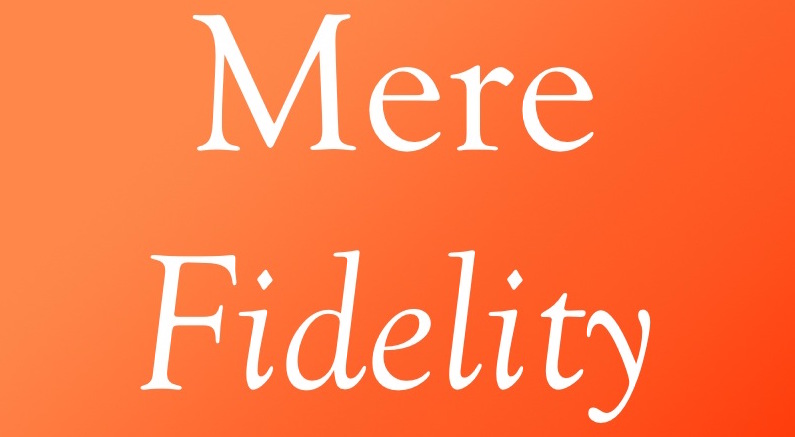
“Port William repaid watching. I was always on the lookout for what would be revealed. Sometimes nothing would be, but sometimes I beheld astonishing sights.”
The lesson from that quote (from Wendell Berry) is that fidelity to a place, a people, or a tradition is often its own reward. This is because learning to actually see something takes a great deal of time. It is only through the virtues of patience and affection that we can come to truly know a place and find our home in it. Seeing these things properly is something that takes a great deal of time to do, and the longer you take at it the more apt you are to realize how much more there is to see. This was the thought I continued to have as I watched the Future of Protestantism event earlier this week.
 The event seems to have been prompted by two things: The first, and more acknowledged, of the two was the discussion stirred up last year by Dr. Peter Leithart when he published his “End of Protestantism” piece for First Things. But the second point, which stood behind much of the discussion and was explicitly mentioned by Dr. Trueman on several occasions, is the increased trendiness amongst younger evangelicals of swimming the Tiber in hopes of finding a more historically informed, sacramentally-grounded church home. Recently on Twitter Alan Jacobs pointed out that the two trends he sees regarding Protestant-Catholic relations are that evangelicals are friendlier to Catholics while the Catholics are becoming ever more critical of the evangelicals. As a result, many younger evangelicals are (reputedly at least, we still don’t have any good data on this) crossing the Tiber as they become more interested in Rome and Rome develops a stronger polemic against their Protestant tradition. One day a curious evangelical college student decides on a whim to read Thomas and within a week they’re convinced that the Roman church is the only holy and catholic church.
The event seems to have been prompted by two things: The first, and more acknowledged, of the two was the discussion stirred up last year by Dr. Peter Leithart when he published his “End of Protestantism” piece for First Things. But the second point, which stood behind much of the discussion and was explicitly mentioned by Dr. Trueman on several occasions, is the increased trendiness amongst younger evangelicals of swimming the Tiber in hopes of finding a more historically informed, sacramentally-grounded church home. Recently on Twitter Alan Jacobs pointed out that the two trends he sees regarding Protestant-Catholic relations are that evangelicals are friendlier to Catholics while the Catholics are becoming ever more critical of the evangelicals. As a result, many younger evangelicals are (reputedly at least, we still don’t have any good data on this) crossing the Tiber as they become more interested in Rome and Rome develops a stronger polemic against their Protestant tradition. One day a curious evangelical college student decides on a whim to read Thomas and within a week they’re convinced that the Roman church is the only holy and catholic church.
There is an irony in many of these conversions, of course, which is that these converts adopt what they often describe as a very Protestant mentality in deciding to convert: They decide that their theology aligns better with Rome’s than, say, Louisville’s and so they go join Rome. The amusing thing is that if you swap “Geneva” for “Rome” and “Dallas” (Dallas being the stand-in for non-denominational, dispensational evangelicalism) for “Louisville” in the previous excerpt than you’ve satisfactorily described the way that many young Reformed Christians became Reformed. In both cases, the person read some books, talked to some people, and came to theological conclusions that prompted them to join a new denomination. Simply put, many Catholic converts from evangelicals continue to act as they think Protestants act even after their conversion precisely because they converted in such a modern, rationalistic way. They found the theology they agreed with, found the church that teaches that theology, and that became home.
But what stood out to me as I listened to Drs. Leithart, Sanders, and Trueman talk is how little I actually know of the classical Protestant tradition. Several years ago I, stereotypically enough, contemplated crossing the Tiber, yet if I had done so I would’ve done so without ever having read many of the greats of the evangelical tradition. At the time, I had a basic acquaintance with Calvin and Luther, but I had never read Edwards, Owen, or Wesley. Nor had I spent any time with Kuyper or Bavinck. My knowledge of NT Wright was similarly limited.
Had I converted, in other words, I would’ve done so from a place of tremendous ignorance and, more distressingly still, a tremendous ignorance of my ignorance. And that is why that Berry excerpt above is so important. When it comes to church membership, many evangelicals have a distressing tendency to make such decisions based purely on degrees of perceived theological agreement. While those things are important, it is dangerous to proceed with that as our only criteria of deciding our church membership because it is based on a series of assumptions that are nearly always false.
First, it assumes that I have an accurate handle on my own theology, which is a dangerous assumption for the reason I already gave: as a limited, finite human being I am incredibly ignorant and part of that ignorance includes being ignorant of how ignorant I actually am. Second, it assumes that I have an accurate handle on the theology of various church traditions. This assumption may be even more problematic. Most major Christian traditions are centuries old and the cardinal works of one single tradition could fill a library. On what basis can I assume that I know the reformed evangelical tradition? Or the Roman tradition? Or the Eastern Orthodox tradition? Third and finally, this approach sneaks in an implicit rationalism, as it assumes that church membership ought to be determined based primarily on theological agreement rather than other factors, such as personal relationships, local communities, and simple fidelity to a people and a place.
That point may well be the clincher. Perhaps this illustration can explain why: I am a fourth generation Nebraskan. My great-grandfather came here from Sweden in 1895 and began farming in the small town of Oakland in northeast Nebraska, which to this day calls itself the Swedish capital of Nebraska—it’s a rather uncontested crown. As a fourth generation member of this place, I have received a certain inheritance in it that I could not possess through any other means. I am an heir of the stories of my grandfather working on the railroad in Havelock, only a half mile from the home I grew up in in northeast Lincoln. I am the inheritor of my mother’s stories of the places she has seen change in Lincoln over the course of her life. I will never know a place the way that I know Lincoln and, should we leave, my daughter will never know any place in the way I know Lincoln, nor will her children or even her grandchildren, for none of them would be fourth generation members of a place. (Of course, if I stay my daughter will know Lincoln even better than I do, being a fifth generation Nebraskan.)
I suspect something like the same point works for church membership. By choosing—that wretched word—to stay Presbyterian even in the teeth of my struggles with problems I perceived in the church, I was making it possible for the church to correct me and to give me a fuller picture of its theological commitments. I was setting my perceived theological disagreement to the side and choosing to participate in the life of the community given to me. As it happened, it was the act of making that choice that made it possible for me to become more settled in my Presbyterianism. But if I had been a good dutiful modern and simply made a rationalistic decision to attend the church I thought agreed with me most, I never would’ve discovered the riches that were set in front of me all along within Presbyterianism. Fidelity to Presbyterianism has helped me to see Presbyterianism more faithfully, in other words. And it is precisely because I committed to it in the midst of my critical questions and theological uncertainty that I was able to receive that knowledge and be corrected by it. Had I instead attempted some sort of neutral, objective theological evaluation of the tradition it is probable that I would have had my suspicions confirmed and that I would no longer be Presbyterian. It was in committing to the faith that I was able to find it—fides quaerens intellectum, as Anselm put it, faith seeking understanding.
Hauerwas has said that modernity is the belief that one has no story except for the story one chose when one had no story. Viewed that way, it is very easy for one to ostensibly adopt an anti-modern theology while still holding tight to one’s methodological modernism. But by setting aside the myth of being a neutral, detached, independent agent capable of objective rationality and instead embracing the given limits of my home church and committing myself to it, I have found that I have been given a story and it is a story that I can profitably read for the rest of my life without becoming bored.
image credit: http://2.bp.blogspot.com/_uoXcKGeeo_0/SxvD3_IhdNI/AAAAAAAAAGI/gqQNMZn-RrU/s1600-h/Jayber_Crow_detail.JPG
Jake Meador is the editor-in-chief of Mere Orthodoxy. He is a 2010 graduate of the University of Nebraska-Lincoln where he studied English and History. He lives in Lincoln, NE with his wife Joie, their daughter Davy Joy, and sons Wendell, Austin, and Ambrose. Jake's writing has appeared in The Atlantic, Commonweal, Christianity Today, Fare Forward, the University Bookman, Books & Culture, First Things, National Review, Front Porch Republic, and The Run of Play and he has written or contributed to several books, including "In Search of the Common Good," "What Are Christians For?" (both with InterVarsity Press), "A Protestant Christendom?" (with Davenant Press), and "Telling the Stories Right" (with the Front Porch Republic Press).
Topics: